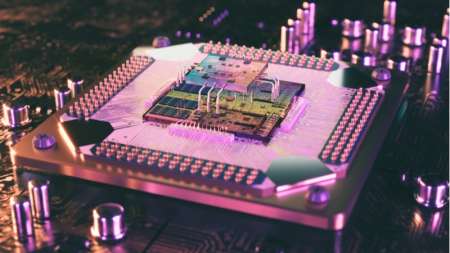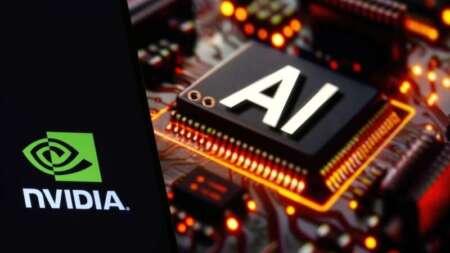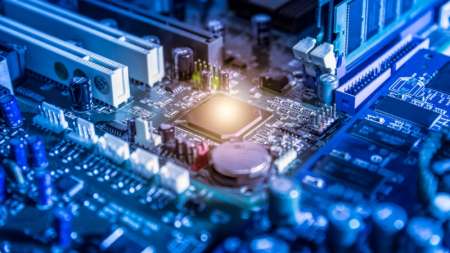The chair of the House Select Committee on China is raising the alarm on China’s use of Nvidia artificial intelligence (AI) chips for military capabilities. […]
The Commerce Department’s Bureau of Industry and Security (BIS) said on Jan. 13 that it has revised its licensing policy for U.S. semiconductor exports to China, and specifically flagged security reviews for products made by Nvidia and Advanced Micro Devices (AMD). […]
President Donald Trump officially secured the 25% share of profits made on advanced Nvidia and AMD semiconductors shipped abroad through a proclamation he signed Wednesday afternoon. […]
Lawmakers and industry experts are warning that President Donald Trump’s decision on Monday to allow the sale of Nvidia-manufactured chips used in advanced artificial intelligence (AI) to China puts national security at risk. […]
The Naval Postgraduate School (NPS) is building an artificial intelligence (AI)-ready force the way a teaching hospital trains clinicians: rigorous classroom learning, side-by-side practice on world-class technology, and real problems. […]
As federal agencies modernize IT systems and prepare for artificial intelligence (AI) compute demands, Supermicro is working with NVIDIA to expand efforts to help the government rapidly deploy purpose-built “AI factory” infrastructure. […]
Northrop Grumman is partnering with NVIDIA to boost and accelerate mission performance in some of the most complex and demanding environments in the world, according to Travis Garriss, vice president and chief information and digital officer for Northrop Grumman. […]
NVIDIA Founder and CEO Jensen Huang announced on Tuesday that the company will build seven new supercomputers powered by artificial intelligence (AI) for the Department of Energy (DOE). […]
Federal Systems Integrators (FSIs) say artificial intelligence (AI) is essential to mission success, but many remain in pilot mode, according to new research released in September by MeriTalk, Dell Technologies, and NVIDIA. […]
Federal civilian CIOs and IT leaders overwhelmingly view artificial intelligence (AI) as essential to mission success, but most remain stuck in pilot mode, according to new research from MeriTalk, Dell Technologies, and NVIDIA. […]
Senate Democrats are asking President Donald Trump to rethink his reported decision to allow top semiconductor chip producers in the United States to sell their products to China in exchange for fees to the government. […]
The National Science Foundation (NSF) is partnering with tech giant NVIDIA to invest a total of $152 million into artificial intelligence models that will accelerate innovation and scientific discovery while supporting priorities under the Trump administration’s AI Action Plan. […]
Federal agencies often face mounting pressure to modernize systems, derive faster insights from data, and deliver mission outcomes at digital speed. But many agencies struggle with the technical, security, and procurement barriers to full-scale AI adoption. That’s the challenge Deloitte set out to help solve with its Silicon to Service (S2S) solution, which is built on the Dell AI Factory with NVIDIA. […]
The next high-powered supercomputer is coming to the National Energy Research Scientific Computing Center (NERSC) under a new contract between the Department of Energy (DoE), Dell Technologies, and NVIDIA. […]
NVIDIA announced on Monday that it is teaming up with manufacturing partners to design and build factories that will for the first time produce NVIDIA AI supercomputers entirely on American soil. […]
NVIDIA and MITRE announced partnerships on March 18 with several other tech companies to develop systems with artificial intelligence networks that will enable 6G network capabilities. […]
The White House announced a new framework today that aims to maintain U.S. leadership in AI by keeping advanced computing chips and AI models under the control of the United States and its allies. […]
As artificial intelligence (AI) increasingly shapes the future of technology, securing digital ecosystems has become a critical imperative. During the NVIDIA AI Summit on Oct. 7-9, NVIDIA Chief Security Officer (CSO) David Reber highlighted the need and the opportunity to transform security architectures to incorporate AI , and effectively secure AI-driven workloads. […]
The Weather Company has partnered with NVIDIA for more than a decade to deploy technologies that enable improved predictions in the modeling of Earth’s weather and climate. […]
While the United States is home to more than half of the top universities in the world, there is more work to be done when it comes to artificial intelligence education – and that’s something NVIDIA is trying to improve. According to U.S. News & World Report, only 10% of the top global AI universities are in the United States. […]
MITRE – which operates federally funded R&D centers for federal sponsors and focuses on scientific and technology issues in the national interest – on Oct. 9 announced the first three use cases for its MITRE Federal AI Sandbox, a supercomputer that will help train advanced AI models using the NVIDIA DGX SuperPOD. […]
Bob Pette, vice president and general manager-enterprise platforms at NVIDIA, offered a sweeping review of the company’s history in artificial intelligence technology development at the NVIDIA AI Summit on Oct. 8 and unveiled the company’s new NVIDIA NIM Agent Blueprint for container security. […]
Human-like robots, or humanoids, have long been prevalent in science fiction movies – take Star Wars’ C-3PO for example. Recent advancements in artificial intelligence and physically-based simulation are accelerating humanoid robot development. NVIDIA provides 3 accelerated computing platforms – NVIDIA DGX, Omniverse, and Jetson AGX for robot makers to make these humanoid robots a reality. […]
A new technology stack is offering government agencies a way to accelerate and simplify their AI data pipelines in the hybrid, multi-cloud environment. […]
Experts say the cybersecurity problem is too vast and complex to be solved by traditional approaches alone. Artificial intelligence (AI) can offer a lifeline to organizations overwhelmed by massive volumes of information technology (IT) and OT data as they try to stay ahead of the next big threat. MeriTalk recently sat down with two cybersecurity and AI experts at NVIDIA – Bartley Richardson, director of cybersecurity engineering, and David Reber, the company’s chief security officer, to discuss how AI can help solve the thorniest cybersecurity challenges. […]
High-performance sensor architectures are allowing for faster data processing as more data continues to become available and requires processing for analysis and artificial intelligence applications, officials from NVIDIA and Lockheed Martin said on March 24 at the NVIDIA GTC Conference. […]
Splunk’s cybersecurity and Security Orchestration, Automation, and Response (SOAR) suite can be combined with NVIDIA Morpheus running on Hewlett Packard Enterprise’s (HPE) Edgeline GPU-accelerated converged edge platform to provide AI-enabled real-time monitoring and remediation of an edge network, all while saving analysts and data scientists time. […]
As use of artificial intelligence (AI) increases across the public and private sector, companies like Lockheed Martin are using AI advancements to further missions and to even collaborate with NVIDIA to address wildfires. […]
On today’s episode of MeriTalking, MeriTalk’s Nicole Burdette sits down with Jay Boisseau, AI & HPC Technology Strategist at Dell Technologies, and Marc Hamilton, Vice President of Solutions Architecture and Engineering at NVIDIA, to explore the steps agencies are taking toward “digital first government” and what this means from a workforce, cybersecurity, and emerging technology perspective. […]
Over the past 20 years, government agencies have worked to shift from paper-based to digital operations. Early efforts, too often, went halfway. Agencies digitized the front end, but back-end operations largely remained the same. And on the front end, a digital customer experience was not as robust as it was in person. For example, early-stage digital government offered citizens access to forms online, which was convenient. But if someone had a question, there was no mechanism for in-person follow-up or an immediate response. […]



























